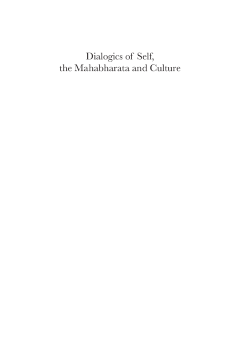
Additional Information
Book Details
Abstract
‘Dialogics of Self, the Mahabharata and Culture: The History of Understanding and Understanding of History’ explores the interrelationships between individual and cultural historical dynamics in interpreting texts, using key concepts from Bakhtin’s theory of dialogics. This ambitious volume discusses the limits of fixed monologic discourses and the benefits of fluid dialogic discourses, and provides a cultural and psychological analysis of the epic Indian text the Mahabharata.
'The author's insightful readings of the ancient text are indeed a tour de force. The data that she acquires from the immigrant Indians yields…a profoundly energetic and lively reading of a great Indian text.' —V. Narayana Rao, Krishnadevaraya Professor of Languages and Cultures of Asia at University of Wisconsin-Madison
'This wonderful book has something to offer readers of many backgrounds… Bandlamudi provides a model of textual scholarship for us all.' —James V. Wertsch, Marshall S. Snow Professor in Arts and Sciences, Washington University in St. Louis
'Dialogics of Self, the Mahabharata and Culture: The History of Understanding and Understanding of History' explores the interrelationships between individual and cultural historical dynamics in interpreting texts, using key concepts from Bakhtin's theory of dialogics. This ambitious volume discusses the limits of fixed monologic discourses and the benefits of fluid dialogic discourses, and provides a cultural and psychological analysis of the epic Indian text the 'Mahabharata'. The problem addressed by 'Dialogics of Self, the Mahabharata and Culture' is not just how we understand and narrate history, but also how the very mechanism by which we understand and narrate history itself has a history. This volume is about the interplay of several histories – that of the individual, individual's past relationship to the text, which in turn is dependent on the nature of encounters they have had in the past, and the history of the text, and the very history of understanding.
‘There is a lot in this book, and the discussions succeed in illustrating and exploring the complex relationships between individual history and memory, sense of self, cultural background, contemporary cultural location, and textual interpretation.’ —Simon Brodbeck, ‘Relegere: Studies in Religion and Reception’
Lakshmi Bandlamudi is Professor of Psychology at LaGuardia Community College, City University of New York. Her research and teaching interests are focused on the area of human development, with a special emphasis on dialogic consciousness. She is also the author of a travelogue.
